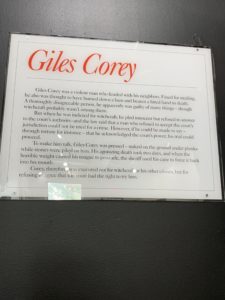We went to Salem.

This Massachusetts coastal town has made a peculiar tourist industry out of the fact that it executed 19 people (and two dogs) on charges of witchcraft in 1692. Four others died in prison or under interrogation.


All respect to Giles Corey, the crotchety octogenarian who let himself be pressed to death rather than admit the court’s authority to try him.
In one of history’s ironic twists, Salem is now an epicenter of modern witchcraft culture and fashion. You can hardly walk a block downtown without coming across a shop selling pentacle jewelry, mini cauldrons, psychic readings, crystals, candles, and dolls in pointy hats. Not to mention, this tribute to Elizabeth Montgomery as Samantha in “Bewitched”.

Visiting Salem as an actual, serious, practicing witch was an adventure in cognitive dissonance and complex emotions–not to mention a temptation to spend way too much money on Goth swag, like this Baphomet pillow I bought to make myself feel better about not getting top surgery.

Aiming for equal parts entertainment and scares, Salem’s witch-tourist museums go in for waxwork tableaux and sensationalist re-enactments of what they call the “witchcraft hysteria”. The presentations include some helpful historical context about the plagues and warfare that stressed the Puritan settlement to the point of irrational scapegoating. Then as now, people were desperate to blame someone for the disconnect between their suffering and the divine blessings they were promised. But of course it would be too controversial to draw those connections for the paying customers, so the popular image of the Puritans remains exotic and remote from the world of their descendants. The official story on the placards is that “of course” witchcraft isn’t real–even as the alternative spirituality business is booming, right outside the door.
Should I, then, mourn Salem’s executed witches as my spiritual ancestors? It’s hard to say, because there’s no good evidence that they considered themselves witches (tortured confessions don’t count). Even if some of them did practice folk magic in secret–practices like hexing or fertility charms having always coexisted alongside official Christianity–the 17th-century witches’ values and cosmology were likely more similar to the Puritans’ than to my Temple of Witchcraft class’s Buddhist-inflected, queer-friendly worldview. Magic is a technology that doesn’t necessarily create common ground among its practitioners. The concentrated collective prayers of right-wing Christians could be seen as a hex designed to wipe out queer people. I began practicing magic in earnest during the Trump years because I perceived a spiritual warfare component to the GOP’s attacks on human rights and Mother Nature. (In my opinion, it’s not really Jesus they are worshiping, but I digress.)
The gender politics of the “hysteria” also left me with unanswered questions. It’s actually remarkable that pre-teen girls’ accusations against prominent men, such as minister George Burroughs, were taken seriously by the church and court system. A number of witches were convicted on the “spectral evidence” of girls’ nightmares and sensations of being pinched by invisible hands. To me this sounded like abuse flashbacks, which can take the form of body memories. (This doesn’t mean, of course, that Burroughs was the real perpetrator; don’t haunt me, George.) In dismissing the entire trials as delusional, we may play into the patriarchal script that anything that can’t be confirmed by outside observers is not credible.
The irreverence of the waxwork history tours troubled me at first, but then I recognized it as a form of “whistling past the graveyard”. At Halloween, we dress up as what we fear, to make our mortal vulnerability manageable through play. We put our heads in the stocks as a joke, to dispel the unease of imagining our own neighbors turning on us.
Salem was also the birthplace of the great fiction writer Nathaniel Hawthorne (1804-64), whose work you can read for free at AmericanLiterature.com. I wrote my college thesis on original sin in his stories “Rappaccini’s Daughter” and “The Birthmark”, two Gothic fantasies about prideful scientists whose drive for “perfection” destroys the women they love most (to the extent that a narcissist can love!). A descendant of witch-trials judge John Hathorne, Nathaniel changed the spelling of his name to distance himself from that history. I understand him better after visiting the Witch City. Throughout his work, he struggles with inherited sin. On the one hand, he wants to hope that descendants can break a cursed pattern, even if the cost to themselves is high. On the other hand, he’s enough of a Puritan to remind progress-intoxicated Americans that human nature is permanently flawed. We trade religion for science, we scoff at the past, but the same impulses that drove the witch trials remain in our hearts.
I don’t think Hawthorne would be a fan of the “Scarlet Letter” coffee mugs in the House of Seven Gables Gift Shop, but this fan art by Wendy Snow-Lang shows why Melville thought Nat was such a snack:

Transition goals, am I right?





